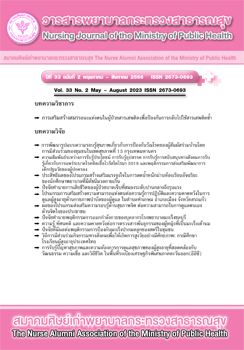Factors Predicting Exercise Behavior of Chonburi Cancer Hospital Personnel
Main Article Content
Abstract
This predictive correlational research aimed to examine exercise behavior and predictive factors among healthcare personnel at Chonburi Cancer Hospital. A sample group refers to personnel working at Chonburi Cancer Hospital, selected by simple random sampling 230 individuals. Data collection took place between April and May 2023, utilizing a comprehensive set of tools consisting of components: 1) personal information, 2) perception of exercise benefits, 3) perception of exercise barriers, 4) self-efficacy in exercise, 5) social support for exercise, 6) situational influence, and 7) exercise behavior. The reliability analysis using Cronbach's alpha coefficient confirmed the high internal consistency of the instruments, with values ranging from .84 to .95.
Data were analyzed using descriptive statistics, Pearson correlation, and multiple stepwise regression analyses. The findings revealed that: 1) the exercise behavior of healthcare personnel was at a low level, while the perception of exercise benefits was high, and the perception of exercise barriers was low, in addition, the perception of self-efficacy for exercise, social support for exercise, and the influence of situational factors on exercise is at a moderate level; 2) self-efficacy in exercise, social support for exercise, and perception of exercise barriers significantly predicted exercise behavior, with standardized regression coefficients (β) of .49, .22, and -.14, respectively. The predictive factors accounted for 40.1% of the variance in exercise behavior (Adjust R2 = .401, p < .001).
Based on these results, it is recommended that nurses implement continuous exercise activities for healthcare personnel at the hospital, fostering appropriate exercise engagement. Hospital administrators should provide exercise facilities and equipment and establish policies that promote exercise among personnel to cultivate a culture of exercise within the organization.
Article Details

This work is licensed under a Creative Commons Attribution-NonCommercial-NoDerivatives 4.0 International License.
บทความและรายงานวิจัยในวารสารพยาบาลกระทรวงสาธารณสุข เป็นความคิดเห็นของ ผู้เขียน มิใช่ของคณะผู้จัดทำ และมิใช่ความรับผิดชอบของสมาคมศิษย์เก่าพยาบาลกระทรวงสาธารณสุข ซึ่งสามารถนำไปอ้างอิงได้
References
Thaikiew S, Palwisut P. Development of investigating exercise behavior model of students using
apriori algorithm. UTK Research Journal 2021;15(1):31-44.(in Thai)
Yamsri T, Toonsiri C, Leelukkanaveera Y. Factors predicting exercise behaviors among nursing
students in Boromarajonani College of Nursing, The North Eastern Region Network. Journal of
Nursing and Health Care 2017;35(2):158-68.(in Thai)
Pakchumni P, Thongsrisuk T, Chuachang A, Sattayarak P. Factor on exercise of students at
Chaiyaphum Rajabhat University. Dhammathas Academic Journal 2021;21(2):13-26.(in Thai)
Kakai T, Suksombat D. Factors affecting exercise behaviors of undergraduate students of higher
education institutions in Nakhon Ratchasima. Sikkha Journal of Education 2021;8(2):193-205.
(in Thai)
Muensaen N, Kraiphibul S. Community participation for health promotion of the elderly in Thungluke Village, Chiang Dao District, Chiang Mai Province. Nursing Journal 2014;41(1):1-12.(in Thai)
Armstrong A, Jungbluth Rodriguez K, Sabag A, Mavros Y, Parker HM, Keating SE, Johnson
NA. Effect of aerobic exercise on waist circumference in adults with overweight or obesity: a
systematic review and meta-analysis. Obesity Reviews 2022; 23(8): e13446.
doi:10.1111/obr.13446
Khampeng S, Boonpradit A, Prommarut A, Poysungnoen Y. The Effects of the self-directed
programs on food consumption, exercise, body weight and blood sugar levels among diabetic
patients in Muang District, Lopburi Province. Nursing Journal of the Ministry of Public Health
;29(2):74-85.(in Thai)
Kiadkangwan T, Arpanantikul M, Malathum P. Factors predicting exercise behavior of middle-
aged female nurses in the Northeast Region of Thailand. Ramathibodi Nursing Journal 2012;
(1):24-42.(in Thai)
Mhaopech K, Choupanich K, Lapho P, Teamtaokerd w: Behaviors for exercises of personnel in
Kasetsart University, Kampheangsaen Campus;2012.
Bundasak T, Jungasem N, Supsung A, Chaichanarungruang W. Prevention of depression among
nursing students. Boromarajonani College of Nursing, Uttaradit Journal 2021;13(1):62-70.
(in Thai)
Pender NJ. Health promotion in nursing practice (6th ed.). New Jersey: Pearson Education;2011.
Suphunnakul P, Sirinual S, Noin J, Chayodom V, Singhadej O. Factors predicting self-care
behaviors among the elderly with type 2 diabetes in Sukhothai Province. EAU Heritage Journal
Science and Technology 2017;11(1):211–23.(in Thai)
Vanichbuncha, K. Advanced statistical analysis by SPSS for Windows. Bangkok: Chulalongkorn
University Book Center;2017.(in Thai)
Khattiya S, Suwajittanon W. Research patterns and statistics. 2nd eds. Prayurawong;2011.(in Thai)
Bandura A. Self-efficacy: The exercise of control. New York: W. H. Freeman;1997.
House JS. Work stress and social support. New Jersey: Prentice Hall;1981.
Hair JF, Black WC, Babin BJ, Anderson RE. Multivariate data analysis. Cengage Learning.
Hampshire, United Kingdom; 2019.
Tuancha-em K, Ariyasajsiskul S. The development of community potential indicator for
exercising promotion. Academic Journal of Thailand National Spots University 2022;14(3):
-29.(in Thai)
Namarak R, Watcharasin C, Deoisres W. Family factors influencing exercise and eating behavior
among elderly with overweight in Muang District, Nakhon Prathom Province. Nursing Journal
;45(3):46-57.(in Thai)
Sirited P, Thammaseeha N. Self-efficacy theory and self-healthcare behavior of the elderly.
Journal of The Royal Thai Army Nurses 2019;20(2):58-65.(in Thai)
Sopha C, Meedech N, Khattipan N, Lim N, Wongkhomlue C, Khamkrueang N, Jinkam S,
Aksornsri A. Factors associated with exercise behavior among undergraduate students during the
COVID-19 pandemic: a cross-sectional correlation study. Nursing Science Journal of Thailand.
;40(4):65-76.(in Thai)
Thammasanit T, Panbamrungkit B, Phokas P, Wanaklang T. The predictive factors on exercise
behaviors of undergraduate students of Rambhai Barni Rajabhat University. Rajabhat Rambhai
Barni Research Journal 2017;11(1):111-21.(in Thai)

